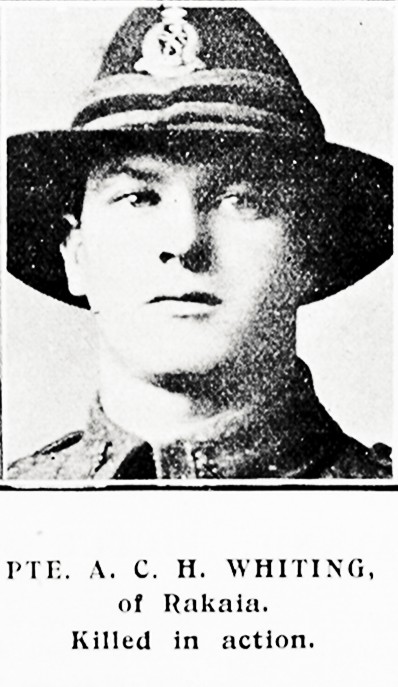Pte
Albert Charles Henry Whiting
Information about birth
|
Date of birth: 27/12/1895 |
|
Place of birth: Ashburton, Canterbury, New Zealand |
General information
|
Profession: Day laborer |
Army information
|
Country: New Zealand |
|
Force: New Zealand Expeditionary Force |
|
Rank: Private |
|
Service number: 53723 |
|
Enlistment date: 02/04/1917 |
|
Units: — Wellington Regiment, 3nd Bn. (Last known unit) |
Information about death
|
Date of death: 20/12/1917 |
|
Place of death: Polygon Wood, Zonnebeke, Belgium |
|
Cause of death: Killed in action (K.I.A.) |
|
Age: 21 |
Cemetery
|
Buttes New British Cemetery, Polygon Wood Plot: I Row: B Grave: 7 |
Distinctions and medals 2
|
British War Medal Medal |
|
Victory Medal Medal |
Points of interest 2
| #1 | Place of birth | ||
| #2 | Place of death (approximate) |
My story
Private Albert Charles Henry Whiting served in the Wellington Regiment, 3rd Battalion, part of the 4th New Zealand Brigade of the New Zealand Expeditionary Force.
In December 1917, the 3rd Wellington Battalion was stationed near Polygon Wood. On the 15th of December they left Walker Camp and moved towards the front line. They embarked on the train at Dickebusch Siding to go to Hellfire Corner. From there, they proceeded to the line and relieved the 2nd Otago Battalion. The 3rd Battalion was to stay in the trenches until the 22nd of December. During this period, eight men were killed and twenty-five were wounded.
It is during this week that Private Whiting lost his life. He was killed in action on the 20th of December 1917. According to a statement in his military personnel file he was in the reserve line boiling water for his tea when he was hit by a shell and killed instantaneously. His remains were exhumed after the war and reinterred in Buttes New British Cemetery, Polygon Wood.
In December 1917, the 3rd Wellington Battalion was stationed near Polygon Wood. On the 15th of December they left Walker Camp and moved towards the front line. They embarked on the train at Dickebusch Siding to go to Hellfire Corner. From there, they proceeded to the line and relieved the 2nd Otago Battalion. The 3rd Battalion was to stay in the trenches until the 22nd of December. During this period, eight men were killed and twenty-five were wounded.
It is during this week that Private Whiting lost his life. He was killed in action on the 20th of December 1917. According to a statement in his military personnel file he was in the reserve line boiling water for his tea when he was hit by a shell and killed instantaneously. His remains were exhumed after the war and reinterred in Buttes New British Cemetery, Polygon Wood.
Sources 1
|
Cunningham W.A., Treadwell C.A.L., Hanna J.S., The Wellington Regiment, N .Z .E .F. 1914 -1919, (Uckfield, The Naval & Military Press, 2003), pg. 235-239. Sources used |
More information 5
|
Commonwealth War Graves Commission Database https://www.cwgc.org/find-records/find-war-dead/casualty-details/480498 |
|
Namenlijst (In Flanders Fields Museum) https://namenlijst.org/publicsearch/#/person/_id=a8738b9a-6df5-4f07-97b8-22da298f2adb |
|
Lives of the First World War (Imperial War Museum) https://livesofthefirstworldwar.iwm.org.uk/lifestory/7185248 |
|
The NZEF Project (UNSW Canberra) https://nzef.adfa.edu.au/showPerson?pid=273055 |
|
Online Cenotaph (Auckland Museum) https://www.aucklandmuseum.com/war-memorial/online-cenotaph/record/C16813 |
